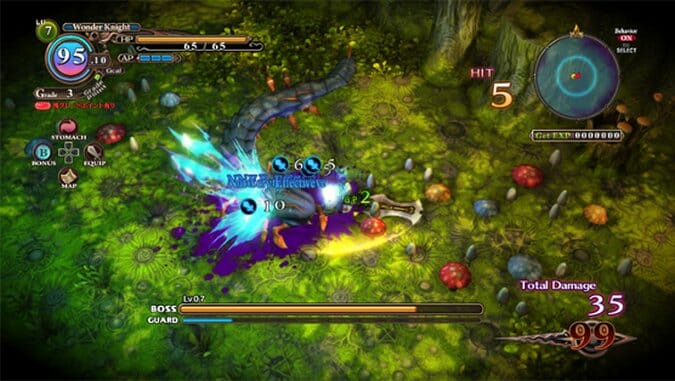The Witch and the Hundred Knight (PS3)

Some games are the best because they are just exactly and powerfully one single beautiful amazing thing, but The Witch and Hundred Knight is more like the Best Super Nintendo Game Ever. That means it is a game that is filled up and down and in every corner with countless hopelessly charming little beautiful amazing things.
The former type of game is suitable for people who have either one billion or one hundred dollars to make a game, either as the result of an individual’s singular vision or the harmony of hundreds of people polishing a gleaming AAA machine. The Witch and Hundred Knight resembles a Super Nintendo game in that it has a small-but-not-too-small team with a fair-but-not-huge budget working with limited technology. It is not like a Super Nintendo game in that the designers have clearly played games made in the last ten years and paid very close attention to them. So Witch and the Hundred Knight gets the best of both worlds. Nippon Ichi Software has historically proven to be very, very good at making tactical RPGs, a skill which they somehow have been able to brilliantly apply to this action RPG, while also making it feel as good and physical and fast and fun as your God Hands or Devil May Crys or Bayonettas.
The game opens with the Hundred Knight as a cute and very pathetic little one-eyed blob looking very confused and lost under the terrifying gaze of the witch’s narrow eyes which glare down at it from the top of the screen. In the first few seconds, the game has established the relationship between the protagonist (slightly cute and slightly evil) and the protagonist’s boss (extremely evil and extremely snarky). You get to pick a name for the Hundred Knight, but the witch promptly ignores it, though she admits it’s really hard to think up a good name right on the spot like that, which is one of the driest meta I have endured in a tutorial while still not leaning into fourth wall-breaking gimmicks too much (something Nippon Ichi has a tendency to do, so it is nice to see them take a break from that). Witch and the Hundred Knight also goes much easier on anime elements, and it is probably the least anime anime game I have reviewed here. There’s a bit of European comics in the aesthetic and the setting, and the grim humor feels driven by the selfish and whimsical personalities of the strange and eccentric magical beings that inhabit this world. That is to say, this is humor based off people—which is pretty rare in games.
The fresh humor in Witch and the Hundred Knight is helped by being straightforwardly playful but also by being a little wicked and evil and dark. The Witch Metallia, who for copyright reasons is definitely not named Metallica, is foul-mouthed, arrogant, and intensely powerful, but she can’t leave her swamp home, so she has summoned a familiar, the legendary Hundred Knight, to spread her swamp across the world. She’s isolated, except for her passive-aggressive Frankensteinian butler, and she doesn’t actually know what she’s doing except that she wants to conquer the world. But, a note: sometimes she goes way, way too far, and it gets kind of unnecessary and uncomfortable. This game is about witches, so it makes a certain amount of sense that the game is about powerful women being awful to each other, but there’s some tone mismatch here that gets ugly.
The little knight, by contrast, with arms too big for its body that drag behind it as it trots about, is the kind of mascot character one might expect to see in ‘90s gaming, except it looks more like an evil ghost than a radical anthropomorphic animal or product placement. The Hundred Knight is completely innocent, starting the game too stupid to respond to anything except with affirmation or ignorance. Later on, it becomes smart enough to say no or be difficult and ask annoying questions, which play a big part in the story and the morality system. The morality system is, for once, skewed in the direction of evil, as that is decidedly what the witch is, and the little minion is there to beat up monsters and terrorize innocent villagers (like most RPGs, you can enter the homes of strangers, but unlike most games, if you want to take random stuff you have to beat up the citizens for it).
The actual game called Witch and the Hundred Knight plays out like—maybe the closest example is console Diablo with some roguelike and Dark Souls elements. The UI looks tasteful but is nonetheless full of an incomprehensible number of things, like you do in a Nippon Ichi game. At the same time, every little thing about Witch and Hundred Knight is actually pretty simple in practice.
 Keep scrolling for more great stories.
Keep scrolling for more great stories.

